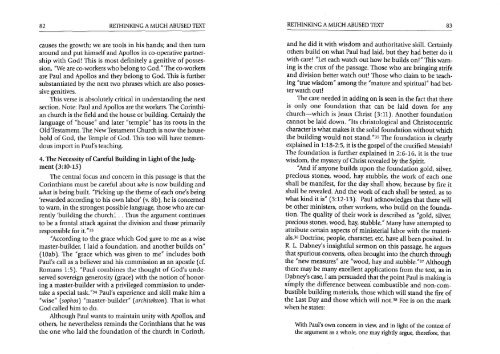1 Corinthians 3.1-15 Abused - Brian Borgman
1 Coríntios
1 Coríntios
Create successful ePaper yourself
Turn your PDF publications into a flip-book with our unique Google optimized e-Paper software.
82 RETHINKING A MUCH ABUSED TEXT<br />
RETHINKING A MUCH ABUSED TEXT 83<br />
causes the growth; we are tools in his hands; and then turn<br />
around and put himself and Apollos in co-operative partnership<br />
with God! This is most definitely a genitive of possession,<br />
"We are co-workers who belong to God." The co-workers<br />
are Paul and Apollos and they belong to God. This is further<br />
substantiated by the next two phrases which are also possessive<br />
genitives.<br />
This verse is absolutely critical in understanding the next<br />
section. Note: Paul and Apollos are the workers. The Corinthian<br />
church is the field and the house or building. Certainly the<br />
language of "house" and later "temple" has its roots in the<br />
Old Testament. The New Testament Church is now the household<br />
of God, the Temple of God. This too will have tremendous<br />
import in Paul's teaching.<br />
4. The Necessity of Careful Building in Light of the Judgment<br />
(3:10-<strong>15</strong>)<br />
The central focus and concern in this passage is that the<br />
<strong>Corinthians</strong> must be careful about who is now building and<br />
what is being built. "Picking up the theme of each one's being<br />
'rewarded according to his own labor' (v. 8b), he is concerned<br />
to warn, in the strongest possible language, those who are currently<br />
'building the church: ... Thus the argument continues<br />
to be a frontal attack against the division and those primarily<br />
responsible for it. "33<br />
"According to the grace which God gave to me as a wise<br />
master-builder, I laid a foundation, and another builds on"<br />
(lOab). The "grace which was given to me" includes both<br />
Paul's call as a believer and his commission as an apostle (cf.<br />
Romans 1:5). "Paul combines the thought of God's undeserved<br />
sovereign generosity (grace) with the notion ofhonoring<br />
a master-builder with a privileged commission to undertake<br />
a special task. "34 Paul's experience and skill make him a<br />
"wise" (sophos) "master-builder" (architekton). That is what<br />
God called him to do.<br />
Although Paul wants to maintain unity with Apollos, and<br />
others, he nevertheless reminds the <strong>Corinthians</strong> that he was<br />
the one who laid the foundation of the church in Corinth,<br />
and he did it with wisdom and authoritative skill. Certainly<br />
others build on what Paul had laid, but they had better do it<br />
with care! "Let each watch out how he builds on!" This warning<br />
is the crux of the passage. Those who are bringing strife<br />
and division better watch out! Those who claim to be teaching<br />
"true wisdom" among the "mature and spiritual" had better<br />
watch out!<br />
The care needed in adding on is seen in the fact that there<br />
is only one foundation that can be laid down for any<br />
church-which is Jesus Christ (3:11). Another foundation<br />
cannot be laid down. "Its christological and Christo centric<br />
character is what makes it the solid foundation without which<br />
the building would not stand. "35 The foundation is clearly<br />
explained in 1:18-2:5, it is the gospel ofthe crucified Messiah!<br />
The foundation is further explained in 2:6-16, it is the true<br />
wisdom, the mystery of Christ revealed by the Spirit.<br />
"And if anyone builds upon the foundation gold, silver,<br />
precious stones, wood, hay stubble, the work of each one<br />
shall be manifest, for the day shall show, because by fire it<br />
shall be revealed. And the work of each shall be tested, as to<br />
what kind it is" (3:12-13). Paul acknowledges that there will<br />
be other ministers, other workers, who build on the foundation.<br />
The quality of their work is described as "gold, silver,<br />
precious stones, wood, hay, stubble." Many have attempted to<br />
attribute certain aspects of ministerial labor with the materials.<br />
36 Doctrine, people, character, etc. have all been posited. In<br />
R. L. Dabney's insightful sermon on this passage, he argues<br />
that spurious converts, often brought into the church through<br />
the "new measures" are "wood, hay and stubble."37 Although<br />
there may be many excellent applications from the text, as in<br />
D~bney's case, I am persuaded that the point Paul is making is<br />
simply the difference between combustible and non-combustible<br />
building materials, those which will stand the fire of<br />
the Last Day and those which will not.38 Fee is on the mark<br />
when he states:<br />
With Paul's own concern in view, and in light of the context of<br />
the argument as a whole, one may rightly argue, therefore, that



